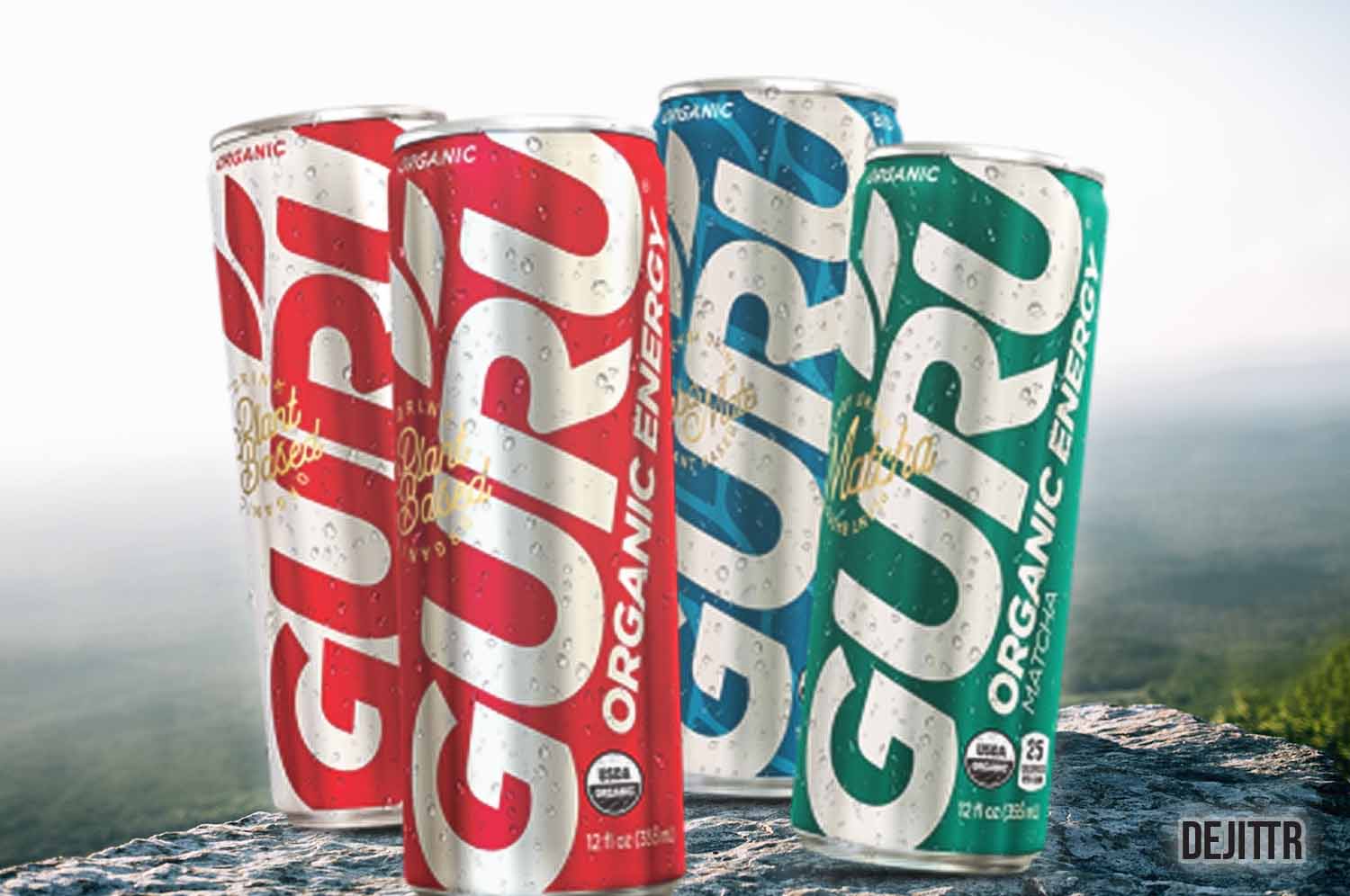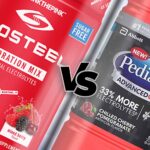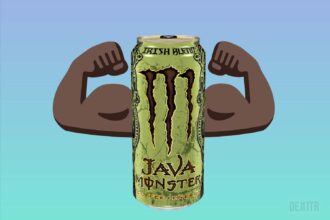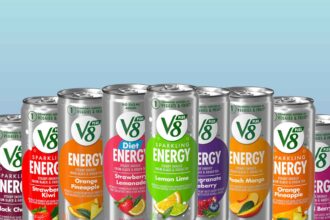Energy drinks get a lot of bad rep from people who can’t tell a Red Bull apart from Monster. Energy drinks have been evolving into more healthy-friendly beverages for a long time. Now they span still water, seltzers, and even juices. Guru has disrupted the market with its organic energy drink. But is this beverage healthy?
Key Takeaways:
Guru Energy Drink is good for you in 8.4-ounce servings containing Amazonian fruit extracts, 100 mg of green tea caffeine, and a wide range of health-supplementing compounds. Guru Energy is plant-based and organic and doesn’t contain synthetic caffeine.
In this article, you will discover the pros and cons of Guru Energy drink alongside a review of its taste and flavor varieties. You will also see how the beverage compares to traditional energy drinks like Red Bull. But first, let’s look at what’s inside the Guru formula.
Guru Energy Drink Ingredients: What’s Inside this Organic Energy Drink?
The team behind Guru Energy markets this drink as a holistic beverage with an organic approach to energizing the human body. Knowing what’s inside the energy drink will help you understand why the beverage stands apart from traditional energy drinks.
Take a quick glance at the Nutrition Facts label, and you will notice fewer isolated chemicals and more organic compounds.
Guru Energy Drink ingredients are Apple Acid, Sparkling Water, Organic Cane Sugar, Guarana Extract, Green Tea Caffeine, Panax Ginseng Extract, Citric Acid, Juice Concentrate, Echinacea Extract, and Natural Flavors.
All extracts in the formula are organic, so Guru Energy Drink has every right to claim to be an “organic” energy drink. I will cover the benefits of this organic approach in the next section. But first, let’s look at the effects of individual ingredients in this beverage:
- Apple Acid – Assists in flavoring, acid regulation, and metabolic activity. In some situations, this ingredient helps with weight loss.
- Sparkling Water – Gives the energy drink a seltzer-like finish. It also helps bring out the tropical elements of its flavor profile.
- Organic Cane Sugar – Cane Sugar provides a bulk of the glucose that gets metabolized quicker with encouragement from caffeine (which is obviously a part of the formula as well).
- Organic Guarana Extract – This can help with blood pressure regulation, heart health, and mood improvement
- Organic Green Tea Caffeine – Green tea has more caffeine than coffee before it is processed to be retail-friendly. Green Tea Caffeine might be more energizing than synthetic caffeine in stores. But this is only a possibility.
- Organic Panax Ginseng Extract – Ginseng has been used as nature’s energy drink as it improves mental alertness and helps one remain focused.
- Citric Acid – Citric Acid plays an acid regulation role in the formula. Without it, you’re more likely to experience acid reflux.
- Organic White Grape Juice Concentrate – Grape juice has various benefits, including boosting immunity and heart health. In different flavors, the juice concentrate used can vary.
- Organic Echinacea Extract – This ingredient is also taken as a supplement to boost immunity.
- Natural Flavors – This unregulated term covers natural flavoring agents. It is unclear which specific agents Guru uses, and the company doesn’t disclose them to protect its formula.
Guru Energy Drink Pros (The Good)
Earlier, we went over the different ingredients and their respective benefits.
Now, we look at Guru Energy Drink overall to unpack its pros compared to traditional energy drinks.
After understanding the positive ways Guru Energy can impact your health, you’ll be better positioned to decide if it is worth switching to.
Energizing Without Artificiality
Despite hundreds of energy drinks entering the market, the underlying formula remains the same: caffeine + sugar = instant energy. And Guru is no different.
If you try Guru Energy, you’ll notice a difference in impact immediately. With 140 mg of caffeine alongside cane sugar, this beverage packs a harder punch than the likes of Red Bull.
While some sugar-free energy drinks have become popular, the most effective ones contain sugar. And among health-friendly ones, Guru is one of a handful that doesn’t use the sugar-free gimmick. Instead, it opts to use organic sugar, which, alongside a higher caffeine dose than Red Bull, can instantly make you feel alert and energized.
Knowing that the beverage is manufactured without the kind of processes that introduce GMOs, carcinogenic pesticides, etc., into foods can be a source of relief. Guru makes it possible to have that piece while being caffeinated.
Organic Immunity-Boosting Compounds
Guru is called Guru because of the amazonian botanical substance, Guarana. It has many health benefits but doesn’t confine its supplementation to Guarana. As you might have noticed in the ingredients breakdown, it encompasses a wide range of extracts that improve immunity.
Other energy drinks, especially Monster Energy and Bang Energy, contain plenty of supplements that individually improve different aspects of skin, muscle, and heart health. However, they isolate or synthesize these chemicals via artificial processes while Guru remains organic.
Rich in Antioxidants
Generally, an antioxidant-rich diet is linked to better heart health. Antioxidants reduce the risk of certain cancers as well as cardiac arrest. They are also linked to better blood circulation, which is required for efficiently energizing the body.
There are energy drinks that are pumped full of individual antioxidants. However, none of them are as organic in their sourcing approach and include them in their final formula.
Guru Energy Drink Cons (The Bad)
Guru rightfully proclaims its spot as an organic plant-based energy drink. From that alone, it seems like it has upsides only.
In reality, Guru Energy Drink has a few drawbacks. Knowing these can help you minimize the adverse effects of Guru Energy on your health.
Contains Too Much Caffeine
This is a relative con. For some consumers, Guru might not have enough caffeine. But on average, Guru Energy Drink contains 40 mg more caffeine than Red Bull and 50 mg higher than a large cup of concentrated coffee.
But is its 140 mg content higher than the recommended consumption limit? Not even close, according to Harvard (400mg daily max).
It is safe to drink Guru energy, but it is inefficient to get used to 140 mg caffeine doses. But if you’re drinking Monster these days, Guru would be a step in the right direction as it has comparatively less caffeine.
Can Cause Weight Gain
Earlier, we discussed the role of sugar in the traditional energy drink formula. Caffeine works best when it can help metabolize sugar and make energy instantly available to the system. Guru is effective in that but at the cost of calorie burden.
Guru contains enough sugar per can to move the weight scale over a month of irresponsible consumption. This conflicts with the fact that almost all the non-caffeine ingredients in the energy drink are beneficial with consistent use.
On the one hand, you must drink Guru energy regularly to avail yourself of its maximum benefits. Conversely, you increase your exercise burden by adding more calories to your diet. Here are a few ways to offset this drawback:
- Adjust your calorie intake – An 8.5-ounce can of regular Guru Energy Drink contains 80 calories. A 12-ounce can contains nearly 100 calories. Simply removing that many calories from your diet can improve offset this effect.
- Exercise more – It takes 30 minutes of brisk walking to get rid of 100 excess calories. Upping your exercise can prevent weight gain from energy drink consumption.
- Opt for Guru Lite – Guru Lite is a version of the Guru Energy Drink with ten calories per can. It is practically impossible to gain weight with a 10-calorie increase in an average diet.
“Harmless” Branding Can Result in Overdosing
Particularly concerning about Guru Energy? It’s branded as limitlessly healthy. The absence of prominent warnings like the ones on Red Bull packaging can lead to unsuspecting consumers overconsuming the beverage.
Like all energy drinks, Guru Energy drink should be consumed in moderation. Too much caffeine can result produce the following side effects:
- Anxiety
- Dizziness
- Diarrhea
- Irritability
How Much Caffeine Is in Guru?
Guru Energy Drink contains 11.9 mg of caffeine in each ounce. Its small cans feature 100 mg caffeine which is harder to overdose on than the 140 mg caffeine cans (12 ounces).
If you consume energy drinks once a day, a 12-ounce can is enough to energize you. It is advisable to consume two 8.4-ounce servings of Guru to be more efficient with caffeine.
Guru Energy vs. Red Bull
Guru Energy drink takes a more organic approach to caffeine. It also has a responsible serving size of 8.4 ounces, with almost as much caffeine as Red Bull’s equivalent can. Here’s a table comparing more Red Bull vs. Guru Energy Drink:
| Guru Energy Drink | Red Bull | |
| Smallest can | 8.4 ounces | 8.4 ounces |
| Largest can | 12 ounces | 16 ounces |
| Caffeine per ounce | 11.67 mg – 11.90 mg | 8.5 mg |
| Calories | 100 | 107 |
| Light version | 10 | 10 |
| Key differentiating point | Organic plant-based energy drink with green-tea caffeine | The first ever energy drink in the world |
| Sweetener | Organic Cane Syrup/Sugar | Sugar |
| Caffeine source | Green Tea Caffeine | Synthetic Caffeine |
| Key stimulants other than caffeine | Guarana and Panax Ginseng Extract | Taurine |
| Is it vegan? | Yes | Yes (original only) |
How Does Guru Taste? (My Personal Review)

I ordered the 6-pack variety box, and here are my tasting notes for Guru Original:
It tastes like a toned-down version of Red Bull with a slight aftertaste that lingers on your hind tastebuds. I’m guessing that lingering aftertaste is due to the amazonian fruit extracts. Overall the taste profile falls on the sweeter side.
While I enjoyed the original Guru Energy Drink, you might find one of its alternative flavors more appealing. Fortunately, the brand offers a variety pack, which is a 6-pack featuring different flavors you can try.
Guru Energy Drink Flavors
Here are my tasting notes for each of the Guru Energy drink flavors:
| Flavor | Notes |
| GURU Organic Energy | Tastes a little like Red Bull but has sweeter notes due to organic cane syrup. |
| Guayusa Tropical Punch | The flavor profile is not as citric as the can design would suggest. It has an OJ-seltzer-like taste towards the beginning, with Guayusa becoming more prominent towards the end. |
| Yerba Maté | Tastes a lot like an acai blend. The beverage is an acquired taste, to say the least. |
| Matcha | Has a powdery green-tea feel towards the end and a strong match center. Not for everyone. |
| GURU Organic Energy – Lite | Tastes less sweet than Guru Original but is the closest to it out of all the flavors. |
Alternative Energy Drinks on the Market
- Guayaki Yerba Mate – This is like the higher caffeine version of Guru.
- Sambazon Organic Amazon Energy Drink – Made by the acai packaging giant Sambazon.
- Rockstar Energy Drink Organic Variety – Not all Rockstar Energy Drinks are organic. The organic ones have “Organic” slapped across the can.
What Makes an Energy Drink Organic?
For an energy drink to be organic, it must contain only products grown on pesticide-free soil (the USDA maintains a list of prohibited items). If soil remains free of such plant accelerants and pesticides for three years and is used to plant the ingredients in an energy drink, it is organic. The USDA may be approached for organic certification.
In Canada, a similar system is applied with the same prohibited items list (due to the same standard for soil purity). However, Canadian products aren’t allowed to be positioned as 100% organic. Instead, all products with a 95% or higher quantity of organic ingredients are lumped under just the “organic” umbrella.
FAQ
Guru Energy Drink is Halal as all the publicly listed ingredients are shariah-compliant. Guru Energy drink is also alcohol-free, which further aligns it with a Muslim-friendly diet.
You might be surprised to learn that an energy drink conglomerate does not own Guru Energy Drink. It is owned by a self-titled company, Guru Energy Drink. The founder of this company is Joe Zakher, while Carl Goyette is its current President and CEO.
Guru Energy Drink is a Canadian company founded in Canada and publicly traded on the Toronto Stock Exchange. Despite not being among the top 5 energy drinks in the world, it is Canada’s leading energy drink.
Photo altered by dejittr.com | Photo attribution: Caleb Frith













